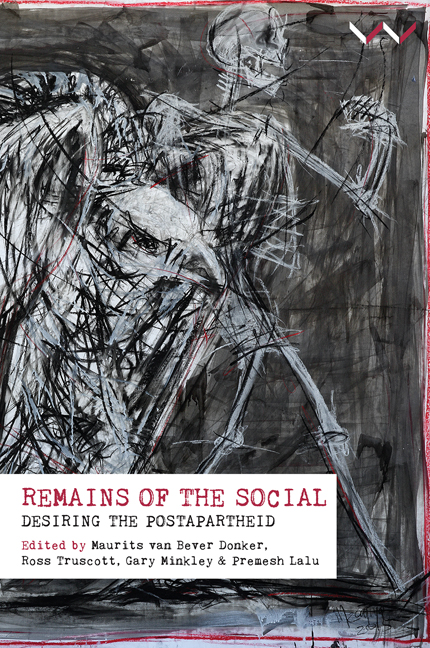Book contents
- Frontmatter
- Contents
- Acknowledgements
- Preface
- Chapter 1 Traversing the Social
- Chapter 2 The Mandela Imaginary: Reflections on Post-Reconciliation Libidinal Economy
- Chapter 3 The Return of Empathy: Postapartheid Fellow Feeling
- Chapter 4 The Ethics of Precarity: Judith Butler's Reluctant Universalism
- Chapter 5 Hannah Arendt's Work of Mourning: The Politics of Loss, ‘the Rise of the Social’ and the Ends of Apartheid
- Chapter 6 Souvenir
- Chapter 7 Re-Cover: Afrikaans Rock, Apartheid's Children and the Work of the Cover
- Chapter 8 The Graves of Dimbaza: Temporal Remains
- Chapter 9 The Principle of Insufficiency: Ethics and Community at the Edge of the Social
- Chapter 10 The Trojan Horse and the ‘Becoming Technical of the Human’
- About the Contributors
- List of Figures
- Index
Chapter 2 - The Mandela Imaginary: Reflections on Post-Reconciliation Libidinal Economy
Published online by Cambridge University Press: 21 April 2018
- Frontmatter
- Contents
- Acknowledgements
- Preface
- Chapter 1 Traversing the Social
- Chapter 2 The Mandela Imaginary: Reflections on Post-Reconciliation Libidinal Economy
- Chapter 3 The Return of Empathy: Postapartheid Fellow Feeling
- Chapter 4 The Ethics of Precarity: Judith Butler's Reluctant Universalism
- Chapter 5 Hannah Arendt's Work of Mourning: The Politics of Loss, ‘the Rise of the Social’ and the Ends of Apartheid
- Chapter 6 Souvenir
- Chapter 7 Re-Cover: Afrikaans Rock, Apartheid's Children and the Work of the Cover
- Chapter 8 The Graves of Dimbaza: Temporal Remains
- Chapter 9 The Principle of Insufficiency: Ethics and Community at the Edge of the Social
- Chapter 10 The Trojan Horse and the ‘Becoming Technical of the Human’
- About the Contributors
- List of Figures
- Index
Summary
Throughout June, July and August 2013, much of South Africa's news media was preoccupied with the question of Nelson Mandela's ailing health. Leaving aside for the time being the question of South Africa's tendency to exhibit a type of media fixation on a single iconic person – the cases of Oscar Pistorius and Julius Malema are clear examples – my objective here will be to offer some speculative comments on the social and psychical significance of this period of uncertainty leading to Mandela's death in late 2013. Considering the meaning of Mandela in this period – as opposed to the period immediately after his death – represents a very different line of inquiry from any ostensibly objective assessment of Mandela's political or symbolic legacy. The reason for this is that I broach the topic of Mandela's role in the what, following Jean-Francois Lyotard, can be called the libidinal economy of the South African nation, that is, in terms of the various clusters of affect and unconscious ideation that his role represented at the time and beyond.
Societal hagiography
I begin by asking: how might one approach the obsessive media speculation concerning Mandela's declining health prior to his eventual death? Popular media commentaries on Mandela during the middle of 2013 as a rule wavered between requests that the public honour appropriate cultural customs – to respect the privacy of Mandela and his family – and an unrelenting thirst for ever more details pertaining to the former South African president and his feuding family. The obvious point to note here is that each such impulse effectively undoes the other, in a to-and-fro, self-perpetuating fashion.
A related tension was also at play. A variety of political personalities and media pundits made the call – presumably preparing us all for the inevitable – that the public needed to ‘let Mandela go’. Verne Harris of the Nelson Mandela Foundation made such a request as early as 2011: ‘He is already gone – as an active voice who offers us a last resort. He is no longer with us. He has been frustrated by our dependence on him. He wants to see us walking without him. We must allow him to go’ (Nuttall & Mbembe 283).
- Type
- Chapter
- Information
- Remains of the SocialDesiring the Postapartheid, pp. 40 - 64Publisher: Wits University PressPrint publication year: 2017



